|
|
|
Sort Order |
|
|
|
Items / Page
|
|
|
|
|
|
|
| Srl | Item |
| 1 |
ID:
125600
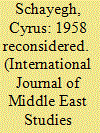

|
|
|
|
|
| Publication |
2013.
|
| Summary/Abstract |
Using Arabic, English, and French sources, and engaging Middle East and Cold War historians, this article makes a threefold argument. First, in United Arab Republic (UAR)-Syria, Jordan, and Lebanon, the 1958-59 explosion of domestic and regional tensions triggered state-formation surges. Second, these formed one process, which made those states more alike, with state-led socioeconomic planning playing a key role. Third, that process partook of a global Third World trend intersecting with the early Cold War. I draw three conclusions. Although existing scholarly readings that the events of 1958-59 in the Arab Middle East formed a crisis but not an ideological or political watershed are correct, from the viewpoint of state formation this crisis was a milestone. Moreover, UAR-Syria, Jordan, and Lebanon had persisting affinities and shared regional positions-notably, the fact that all were sandwiched between the unstable poles of the Arab state system, Iraq and Egypt-that shaped their individual postindependence histories of state formation. Last, Washington's low-profile involvement in this state-formation surge illustrates how domestic sociopolitics and regional geopolitics-including the UAR's peaking popularity and influence in 1958-59-affected U.S. policy in the Cold War postcolonial world.
|
|
|
|
|
|
|
|
|
|
|
|
|
|
|
|
| 2 |
ID:
120284
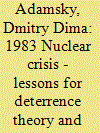

|
|
|
|
|
| Publication |
2013.
|
| Summary/Abstract |
This article distills insights for the scholarship of deterrence by examining the 1983 nuclear crisis - the moment of maximum danger of the late Cold War. Important contributions notwithstanding, our understanding of this episode still has caveats, and a significant pool of theoretical lessons for strategic studies remain to be learned. Utilizing newly available sources, this article suggests an alternative interpretation of Soviet and US conduct. It argues that the then US deterrence strategy almost produced Soviet nuclear overreaction by nearly turning a NATO exercise into a prelude to a preventive Soviet attack. Building on historical findings, this article offers insights about a mechanism for deterrence effectiveness evaluation, recommends establishing a structure responsible for this endeavor, and introduces a new theoretical term to the strategic studies lexicon - a 'culminating point of deterrence'.
|
|
|
|
|
|
|
|
|
|
|
|
|
|
|
|
| 3 |
ID:
138438


|
|
|
|
|
| Summary/Abstract |
As Army chief of staff, secretary of state, and secretary of defense, George C. Marshall played a major role in creating, implementing, and defending the multilateral “Europe-First” global strategy that guided U.S. foreign and military policies through World War II and the Cold War. This lecture explores how and why he did so, emphasizing the decision to defeat Germany before Japan, the postwar European Recovery Program that bears Marshall’s name, and the relief of General Douglas MacArthur during the Korean War for his refusal to accept this grand strategy. In the process it analyzes the complex relationship that exists between diplomatic and military history.
|
|
|
|
|
|
|
|
|
|
|
|
|
|
|
|
| 4 |
ID:
151544
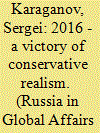

|
|
|
|
|
| Summary/Abstract |
In the winter of 2014, two months before the events in Crimea, when it was already clear that the confrontation with the West was getting increasingly tense, I read again Leo Tolstoy's War and Peace. I was struck by a phrase that had not caught my attention before: "A battle is won by those who firmly resolve to win it." I realized then that Russia would resolve and win.
|
|
|
|
|
|
|
|
|
|
|
|
|
|
|
|
| 5 |
ID:
122274
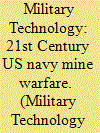

|
|
|
|
|
| Publication |
2012.
|
| Summary/Abstract |
See mines and the need to counter them have been constants for the US navy since its earliest days. Mines and countermeasures figured prominently in the US Civil War, Spanish American War, Both World Wars, Korea, numerous Cold War, Crises, and Operation Desert Storm and Iraqi freedom. Today, traditional navies as well as maritime terrorists can and do use mines and underwater IEDs (UWIEDs) to challenge military and commercial use of the seas. These "weapons that wait" are the quintessential global asymmetric threat, pitting our adversaries' strengths against what they perceive as US naval and maritime weaknesses.
|
|
|
|
|
|
|
|
|
|
|
|
|
|
|
|
| 6 |
ID:
091282
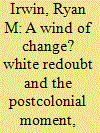

|
|
|
|
|
| Publication |
2009.
|
| Summary/Abstract |
In July 1963, U.S. Secretary of State Dean Rusk held a private meeting with Dr. Willem Naude, the ambassador from South Africa. "A rough time [is] ahead," Rusk explained as the representative sat down in his office. "We are under enormous pressure but do not intend to give in." Several members of the so-called African bloc at the United Nations had successfully protested the practice of apartheid-South Africa's system of institutionalized racial discrimination-in the Security Council that year, and pressure was rapidly mounting in the General Assembly for mandatory economic sanctions against South Africa. The ambassador looked across Rusk's desk and noted that it was "ironical" that ten years earlier they had been allies in the Cold War, and now his country was being isolated in its struggle against a "common enemy." He went on to assert, "The United States [is] to a large degree responsible for releasing these revolutionary forces in the world. The goal of a great power should be to play down tensions and try to get people to talk together, but the United States without even opening its mouth [has] released dangerous forces in the world." Rusk paused for a moment before responding, "[I wonder] if these forces [are] not deeply rooted in the nature of man. [I wonder] if this discourse has not been going on for 2,000 years. Did not man, like most animals, not like to be pushed around too much?"
|
|
|
|
|
|
|
|
|
|
|
|
|
|
|
|
| 7 |
ID:
126736
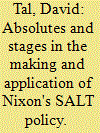

|
|
|
|
|
| Publication |
2013.
|
| Summary/Abstract |
President Richard Nixon and his National Security Adviser, Henry Kissinger took great pride in their success to achieve agreements on the limitation of Anti Ballistic Missiles and the Interim Agreement on Strategic Missiles with the Soviet Union. For Nixon, this agreement was not only an achievement that had been denied to his predecessor, it also seemingly represented the success of his own approach over that of his predecessors. Nixon-in tandem with Kissinger-intended to link arms control negotiations with the Soviet Union to the resolution of other political problems such as Vietnam, the Mideast, and Berlin. Through the employment of linkage, they hoped to make U.S. arms control policy part of Détente. However, Nixon was able to sign the "historic agreements" because his policy of linkage had in fact failed. It failed mainly because it was based on flawed assumptions and false premises. Thus, the historic success was possible precisely because Nixon had not actually made his arms control policy "distinct" from that of the Johnson Administration and its predecessors in his approach to strategic arms talks with the Soviet Union
|
|
|
|
|
|
|
|
|
|
|
|
|
|
|
|
| 8 |
ID:
108107
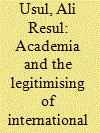

|
|
|
|
|
| Publication |
2011.
|
| Summary/Abstract |
This article aims to highlight the connection between academic studies and international politics and to provide an academic justification of foreign policies with particular reference to the case of democratisation studies. It embodies a two-way relationship. On the one hand, the conjunctures of international politics influence the nature of academic studies in the discipline of Political Science; on the other hand, academic studies may sometimes be employed as sources of legitimisation of the foreign policies of states. The article discusses these connections, providing particular examples of academic studies of the democratisation process during the Cold War and the post-cold war era.
|
|
|
|
|
|
|
|
|
|
|
|
|
|
|
|
| 9 |
ID:
119432
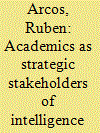

|
|
|
|
|
| Publication |
2013.
|
| Summary/Abstract |
The political changes occurring since the end of the Cold War have led to a rethinking of the structures and procedures of national intelligence systems. Policies of openness and interaction regarding these systems' external elements are becoming increasingly important. At the same time, business, non-profit, and governmental organizations in general have become aware of the need to manage relationships with their stakeholders if they want to succeed in accomplishing their missions.
|
|
|
|
|
|
|
|
|
|
|
|
|
|
|
|
| 10 |
ID:
159970
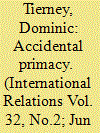

|
|
|
|
|
| Summary/Abstract |
Why did states fail to balance against the United States after the end of the Cold War? Scholars have neglected an important dynamic: the accidental nature of America’s rise to primacy. The United States became the sole superpower not by deliberately increasing its capabilities but due to the unexpected collapse of its rival, the USSR. The case illustrates that a state’s responsibility for its gains in power can vary significantly, with important consequences for subsequent balancing. Active or deliberate power increases tend to produce more balancing than passive power increases because they signal aggressive intentions, alter the dyadic power balance between the rising state and potential balancers, and trigger loss aversion.
|
|
|
|
|
|
|
|
|
|
|
|
|
|
|
|
| 11 |
ID:
131507


|
|
|
|
|
| Publication |
2014.
|
| Summary/Abstract |
Two parallel norms mandate an international duty to hold state leaders individually accountable for serious corruption and human rights crimes. The development of these new norms is poorly explained by realist and neoliberal perspectives, but there are also weaknesses in recent constructivist explanations of norm diffusion that emphasize agency at the expense of structure. Such approaches have difficulty explaining the source of and similarities between new norms, and treat norm entrepreneurs as prior to and separate from their environment. In contrast, drawing on sociological institutionalism, we present a more structural explanation of individual accountability norms. The norms derive from an overarching modernist world culture privileging individual rights and responsibilities, as well as rational-legal authority. This culture is more generative of norm entrepreneurs than generated by them. The specific norms are instantiated through a process of "theorization" within permissive post-Cold War conditions, and diffused via mimicry, professionalization, and coercive isomorphism
|
|
|
|
|
|
|
|
|
|
|
|
|
|
|
|
| 12 |
ID:
048735
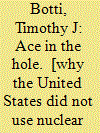

|
|
|
|
|
| Publication |
Westport, Greenwood Press, 1996.
|
| Description |
xi, 311p.
|
| Series |
Contributions in military studies; no. 165
|
| Standard Number |
0313299765
|
|
|
|
|
|
|
|
|
|
|
|
Copies: C:1/I:0,R:0,Q:0
Circulation
| Accession# | Call# | Current Location | Status | Policy | Location |
| 039336 | 355.0270973/BOT 039336 | Main | On Shelf | General | |
|
|
|
|
| 13 |
ID:
153580
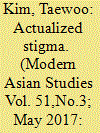

|
|
|
|
|
| Summary/Abstract |
During the Open Port period and Japanese colonial period (1876–1945), Koreans generally had a positive image of the United States. This positive view of the United States held by Koreans persisted until after liberation from Japanese colonial rule in 1945. The United States was a ‘liberator’ that saved the Koreans, and was viewed as ‘a cooperator’ with whom Korea was to solve its national task of establishing a new country. However, the concept of ‘American imperialist warmonger’ had begun to be promoted in North Korea from 1948–49. It was a concept advanced by the Soviet Union and the North Korean leadership. The negative image of the United States, which spread throughout North Korea from the early years of the Cold War, was merely a perplexing stigma lacking substantiated grounds. However, the experiences of the Korean War actualized the image of the United States as a ‘warmonger’ in the hearts of the North Korean people. Alleged indiscriminate aerial bombings, mass slaughters, sexual assaults, and arson attacks against Korean civilians became the most important reason for the expansion of intense sentiment. Anti-Americanism began to be systemized and routinized in every aspect of North Korean life after the Korean War.
|
|
|
|
|
|
|
|
|
|
|
|
|
|
|
|
| 14 |
ID:
083985
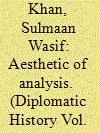

|
|
|
| 15 |
ID:
005255
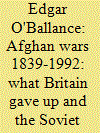

|
|
|
|
|
| Publication |
London, Brassey's, 1993.
|
| Description |
xvii,259p.
|
| Standard Number |
0-08-040722-6
|
|
|
|
|
|
|
|
|
|
|
|
Copies: C:1/I:0,R:0,Q:0
Circulation
| Accession# | Call# | Current Location | Status | Policy | Location |
| 036095 | 355.0209581/OBA 036095 | Main | Withdrawn | General | |
|
|
|
|
| 16 |
ID:
049384
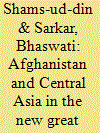

|
|
|
|
|
| Publication |
New Delhi, Lancer's Books, 2003.
|
| Description |
193p.
|
| Standard Number |
817095097X
|
|
|
|
|
|
|
|
|
|
|
|
Copies: C:1/I:0,R:0,Q:0
Circulation
| Accession# | Call# | Current Location | Status | Policy | Location |
| 046452 | 320.9009581/SHA 046452 | Main | On Shelf | General | |
|
|
|
|
| 17 |
ID:
063354
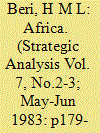

|
|
|
|
|
| Publication |
May-Jun 1983.
|
|
|
|
|
|
|
|
|
|
|
|
|
|
|
|
| 18 |
ID:
095514


|
|
|
| 19 |
ID:
058882
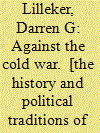

|
|
|
|
|
| Publication |
London, I.B.Tauris, 2004.
|
| Description |
vii, 294p.
|
| Standard Number |
1850434719
|
|
|
|
|
|
|
|
|
|
|
|
Copies: C:1/I:0,R:0,Q:0
Circulation
| Accession# | Call# | Current Location | Status | Policy | Location |
| 049173 | 327.1/LIL 049173 | Main | On Shelf | General | |
|
|
|
|
| 20 |
ID:
123195
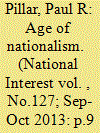

|
|
|
|
|
| Publication |
2013.
|
| Summary/Abstract |
THE URGE to apply era-defining labels to global affairs is strong and enduring. A label and a few easy-to-understand attributes associated with it can impart a reassuring simplicity to what is actually a complex and often-intractable reality. While the disadvantages of era labeling, including oversimplification, are probably as great as the advantages, the practice is here to stay.
|
|
|
|
|
|
|
|
|
|
|
|
|
|
|
|
|
|
|
|
|